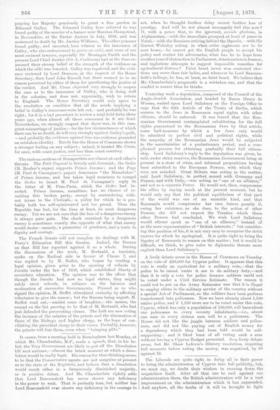It seems, from a meeting held in Birmingham last Monday,
at which Mr. Chamberlain, M.P., made a speech, that, in his be- lief, the Tory Government are likely to put off the Dissolution till next autumn,—almost the latest moment at which a dies°. lution:would be really legal. His reason for thus thinking seems to be that the Conservative agents are not sanguine at present as to the state of the Registers, and believe that a dissolution would result either in a dangerously diminished majority, or in positive defeat. And Mr. Chamberlain rightly adds that Lord Beaconsfield has never shown any deficiency in the power to wait. That is perfectly true, but neither has Lord Beaconsfield ever shown any deficiency in the courage to act, when he thought further delay meant further loss of prestige. And will he not almost necessarily feel this now ? If, with a peace that, to the ignorant, sounds glorious, in Afghanistan,—with the immediate prospect at least of peace in Natal,—with the Russians retiring behind the Danube, with Sir Garnet Wolseley asking in what order regiments are to be. sent home,—he cannot get the English people to accept his policy and scatter his adversaries, what has he to hope from another year of obstruction in Parliament, deterioration in finance,. and inglorious attempts to suggest impossible remedies for agricultural distress P Faint heart never won contested elec- tions any more than fair ladies, and whatever be Lord Beacons-. field's failings, he has, at least, no faint heart. We believe that Mr. Chamberlain's prognostic is a mistaken one, and that the conflict is nearer than he thinks.


































 Previous page
Previous page